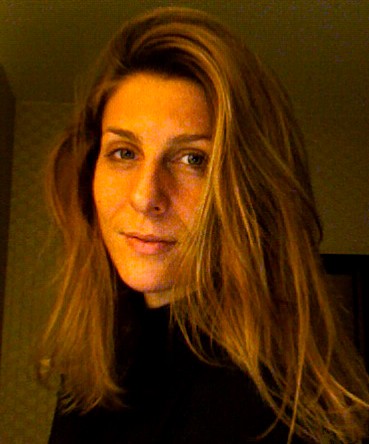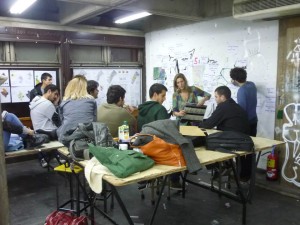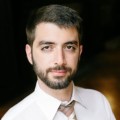 Fulbright Scholar Laura Wainer is a GPIA student concentrating in development. Originally from Buenos Aires, Argentina, she moved to NYC during the summer of 2013 to attend The New School. She holds a bachelor’s degree in architecture from the University of Buenos Aires with a specialization in Development in Urban Regions from the General Sarmiento National University. In this interview Laura discusses her perspectives on NYC, why she chose to attend The New School and her professional and academic history.
Fulbright Scholar Laura Wainer is a GPIA student concentrating in development. Originally from Buenos Aires, Argentina, she moved to NYC during the summer of 2013 to attend The New School. She holds a bachelor’s degree in architecture from the University of Buenos Aires with a specialization in Development in Urban Regions from the General Sarmiento National University. In this interview Laura discusses her perspectives on NYC, why she chose to attend The New School and her professional and academic history.
What impressions of NYC have you developed since arriving?
Like New York, Buenos Aires is a large and complex city. [Buenos Aires] has 15 million inhabitants that live in a sophisticated context but still have to face the typical problems of a median-income country, mostly related with housing precariousness and unsatisfactory urban services. Although NYC is very unequal too (its GINI is 0,06 points greater), some things work efficiently, such as the public transportation system, a vital service that has great influence on people’s quality of life.
I love the diversity of urban environments. I enjoy walking down a noisy congested avenue and then turning the corner and being in a calm, quiet residential neighborhood. This control of scales and flows is an incredible aptitude. Another thing that I like is NYC diversity. Quoting Jane Jacobs, cities are “by definition, full of strangers and the place where the unexpected happens”. This city is the best example of that stimulating idea.
One thing I dislike about living here is seeing that socially vulnerable groups are highly exposed to serious problems (mostly related with urban poverty) in a rich city that has the technical and financial resources to solve them.
Why did you decide to attend The New School?
Studying abroad was always a dream of mine and when the opportunity was presented, I felt like it was now or never. I liked the reputation The New School has for fostering anti status quo schools of thought. In Buenos Aires I met Michael Cohen, the director of the GPIA program, who first introduced me to the different academic offers [of The New School]. By that time I was concerned about becoming too specialized in my field and –consequently- having a partial understanding of what happens and influences cities’ processes. In this sense, I felt that the GPIA was well rounded to complement my background in architecture and urban planning. The wide range of courses would allow me to comprehend urban environments from many different angles, improving my critical thinking. In my opinion, having a better understanding of macro-economics, political theory and development theories is as relevant as understanding how housing, infrastructure and transportation policy works.
I chose the development concentration because nowadays it is impossible to think about development without taking in account urban territories. Cities are the center of gravity of almost all the social, cultural, political, economic processes globally. How to face inequality and poverty? How to make cities more productive and sustainable? How to insert urban development in a national strategy? For me, thinking about cities and development is inseparable.
What is one professional position you have held that has been important to your development?
I started working in urban planning at a time of strong transformations for local administrations in Buenos Aires. The Metropolitan Region is distributed between two federal governments and 40 municipalities. Because [of] our federal system, the latter [has] the size of a country –demographically speaking- but cannot have financial and political autonomy. Before the socio-economic crisis of 2001, urban planning was not an issue in the local agendas, which were focused on solving the most urgent problems of a huge disadvantaged population. The turning point came after the crisis, when the federal government implemented a decentralization policy, mayors began to have consideration about [their] territory and urban planners reformulated the practice in [Argentina].
In the middle of this process, I got my first job as an [urban] planner. It was [to develop] a strategic plan for a municipality of 600,000 inhabitants. During my early approach, I comprehended how poverty is reinforced through the precariousness of the built environment. Also noticed that most of the difficulties in improving urban problems were based on management deficits and institutional competencies. Since then I have focused on projects related to development and alternative management methods. During the last years I worked in several projects funded by governments and international agencies, which include the development of housing, infrastructure, transport and landscape design.
 Prior to coming to The New School you had a combined 13-year history as a student and assistant teacher at The University of Buenos Aires. What are the differences between The University of Buenos Aires and The New School?
Prior to coming to The New School you had a combined 13-year history as a student and assistant teacher at The University of Buenos Aires. What are the differences between The University of Buenos Aires and The New School?
Much of the differences between the University of Buenos Aires and The New School are the differences between public and private universities. Each system has its pros and cons. The University of Buenos Aires is a public institution and is free for students to attend. That makes the university environment very rich and diverse; students hold a wide range of ideologies and social backgrounds. The public character implies that the whole society is paying your education, so students and faculty are very committed with the institution, building all together a space for personal development and social commitment. On the other hand, the university is underfunded, class sizes are huge and usually there is a teacher shortage. Teachers’ salaries are low requiring them to hold other jobs outside, and usually have no time or resources to provide individualized attention to students. This problem is addressed with a decentralized system with many teacher assistants that cover an adequate relationship with the students.
At The New School I found a more direct relationship with the professors, who are usually full time, [this] allows them to have more dedication and be aware of latest publications and academic activity in general. Also, here students’ nationalities are more diverse, making classes very stimulating and spaces of cultural exchange.
You wrote a series of articles for the online publication Café de las Ciudades. What was the topic of the article?
Cafe de las Ciudades encourages urban development conversations outside of an academic context. Upon returning from a two-month trip exploring the urban environments of India I wrote a series of articles discussing my impressions surrounding the cities.
Click here for Laura's articles in Spanish http://www.cafedelasciudades.com.ar/lugares_78.htm You are a 2012 recipient of the Fulbright Scholarship. What was the application process like and what advice would you give to other Fulbright applicants? Completing the application gave me the opportunity to review my career and life so that I could decide what I wanted to do next. The application process was very challenging on many levels and full of anxiety. My advice is don’t go through it alone. It is important to create a circle of trust that includes a few people that will help and support you during the process. In my case, it was vital to have four individuals who critiqued my writings while providing me with emotional support. You should choose them strategically, considering that each one may play a specific role in helping you complete the application process. Another piece of advice is never pretend to be someone else. You should write from a rational but sensitive side. Ask for letters of recommendation from people who know you well and believe in your commitment to your dreams. You should have some fun too. If you enjoy reading your story others will too. Finally, always keep in mind that winning a scholarship depends on endogenous and exogenous factors, some things are completely out of your scope of control and rely on luck. What challenge have you faced thus far as a student in the GPIA program? The major challenge has been my speech. Trying to [express] complex ideas in English [in] class was very frustrating at the beginning. Then I started to make fun of my speaking and of me. That functioned to take relevance to the issue and having a participating attitude. That attitude helped me to accept my new limitations and understand that they are also part of what I am here. What would be your ideal job after graduation? This is a very American question. In Latin America it is not common to make long-term plans because we usually don’t have enough control over our situations for this to be practical. Also, we think about processes and professional careers more than specific jobs. With that said, I do know that I would like to be a public policy decision maker in urban affairs and keep my academic commitment [to] higher education. What advice would you give to students coming from Latin America to The New School to study? Get involved with the Observation on Latin America!
http://www.cafedelasciudades.com.ar/lugares_79.htm
http://www.cafedelasciudades.com.ar/lugares_80.htm
http://www.cafedelasciudades.com.ar/lugares_81.htm
http://www.cafedelasciudades.com.ar/lugares_82_2.htm
http://www.cafedelasciudades.com.ar/lugares_83.htm




